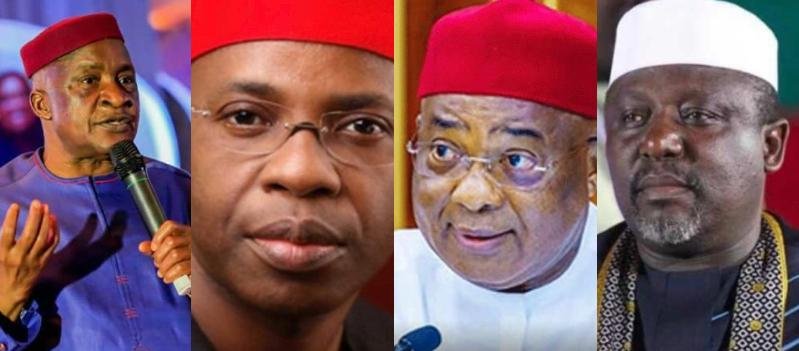[ad_1]
Imo State, in South-east Nigeria, has witnessed a dynamic political landscape since the country’s return to democratic rule in 1999.
Unlike most other states where power has rotated among one, two or three political parties, Imo has elected its own governors from four different political parties.
The Peoples Democratic Party (PDP), Progressive People’s Alliance (PPA), All Progressives Grand Alliance (APGA) and All Progressives Congress (APC) have all held power in the Heartland State.
Governorship elections in the state have been marked by intense competition, electoral controversies and shifting political alliances. The state is once again poised for another one this Saturday.
PREMIUM TIMES examines the political dynamics of Imo State.
PDP’s undisputed dominance: 1999-2007
The 1999 election, the first under the Fourth Republic, produced Achike Udenwa of the Peoples Democratic Party (PDP). Mr Udenwa was reelected in 2003. His victory was attributed to several factors, including the national popularity of the PDP.
The dominant party in Nigeria at the time, it enjoyed a strong organisational structure that provided Mr Udenwa with a solid platform for campaigning and mobilising support.
Aside from PDP’s strength, the perceived weaknesses of his opponents also played a crucial role. In both elections, the opposition parties were fragmented, making it difficult for them to pose a formidable challenge to Mr Udenwa’s PDP.
PPA Interlude: 2007
As the PDP grew stronger in Nigeria and in the South-east, catering to all interests within the party became increasingly challenging. Picking a generally accepted candidate as flagbearer after Mr Udenwa proved to be a herculean task.
Some of his rivals reacted to Ifeanyi Ararume’s emergence as the PDP candidate for the 2007 election by leaving the party to pursue their ambitions elsewhere.
One such was Ikedi Ohakim who condemned the “commercialisation” of the party’s ticket. Mr Ohakim’s gamble to run on the ticket of the Progressive People’s Alliance (PPA) paid off as he snatched power from the PDP.
His victory was largely attributed to the infighting in the PDP where many aggrieved members ignored Mr Ararume and voted instead for Martins Agbaso of the All Progressives Grand Alliance (APGA), allowing Mr Ohakim to sneak into victory.
Mr Ohakim returned to the PDP, but power refused to return to the party. He failed in his second term bid as the candidate of the party.
The governor initiated many development projects but he also faced several allegations of corruption and financial mismanagement and lost the 2011 election to Rochas Okorocha of APGA.
The Okorocha era
Rochas Okorocha’s victory was a significant shift in Imo State’s political landscape. His populist approach, including his free education policy, resonated with a significant portion of the electorate. However, his tenure was also marked by controversy, including allegations of corruption and human rights abuses.
Mr Okorocha, after his victory on the APGA ticket, moved to the APC and won a second term on the ticket of the new party.
However, his bid to install his son-in-law, Uche Nwosu, as his successor was met with strong opposition in the APC, which eventually led to Mr Nwosu contesting on the Action Alliance platform in 2019.
Though Mr Nowsu gave a tough fight, Emeka Ihedioha of the PDP was declared winner by INEC.
But Mr Ihedioha was in office for only seven months. In January 2020, the Supreme Court, in a controversial ruling, declared Hope Uzodinma of the APC, whom INEC had returned in the fourth position in its declaration, as the winner of the 2019 poll.
Mr Uzodinma’s victory surprised many and has been attributed to a combination of factors, including internal divisions within the PDP and the APC’s control of the federal government.
Factors influencing electoral outcomes in Imo
Several factors have consistently influenced the outcomes of governorship elections in Imo State.
Party affiliations are strong in the state as seen in the early dominance of the PDP in the state. The subsequent rise of the APC has also played a significant role in shaping electoral outcomes.
Personal qualities and campaign strategies of individual candidates have also been crucial in determining their successes or failure.
Sadly, questionable electoral calls and judicial pronouncements have also proved vital in putting governors in office in Imo State
Allegations of electoral irregularities, including manipulation of votes and voter intimidation dogged the heels of some of the elections, raising questions about the fairness of the process.
The prevailing economic and social conditions in the state have also influenced voter preferences, with candidates promising populist solutions to pressing issues often gaining an advantage. The issue of vote buying also influenced the course of the elections.
These developments highlight the dynamic nature of politics in Imo State and the challenges of ensuring fair and credible elections.
As the state continues its democratic journey, addressing these challenges and fostering a more inclusive and transparent electoral process will be crucial if the will of the electorate is to prevail at the polls.
Support PREMIUM TIMES’ journalism of integrity and credibility
Good journalism costs a lot of money. Yet only good journalism can ensure the possibility of a good society, an accountable democracy, and a transparent government.
For continued free access to the best investigative journalism in the country we ask you to consider making a modest support to this noble endeavour.
By contributing to PREMIUM TIMES, you are helping to sustain a journalism of relevance and ensuring it remains free and available to all.
Donate
TEXT AD: Call Willie – +2348098788999
[ad_2]
Source link








